中考英语复习语法突破第十二节句子种类课件(共45张PPT)
文档属性
| 名称 | 中考英语复习语法突破第十二节句子种类课件(共45张PPT) |

|
|
| 格式 | ppt | ||
| 文件大小 | 804.0KB | ||
| 资源类型 | 教案 | ||
| 版本资源 | 通用版 | ||
| 科目 | 英语 | ||
| 更新时间 | 2024-03-01 17:00:23 | ||
图片预览

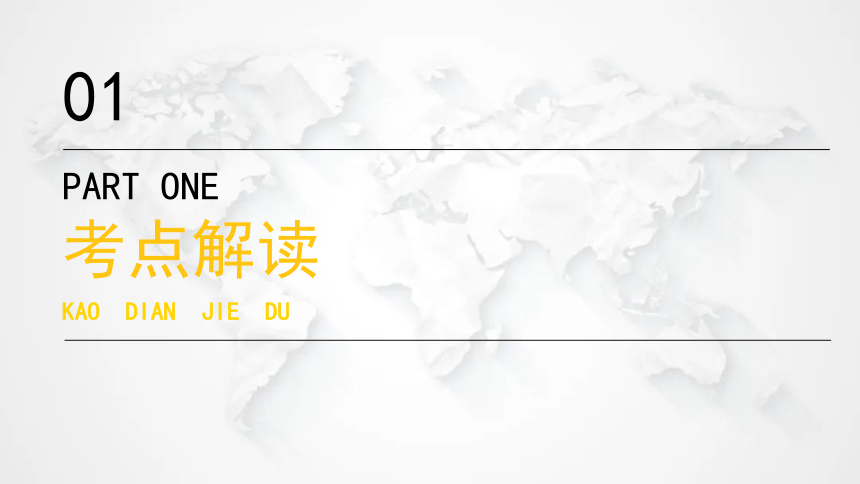
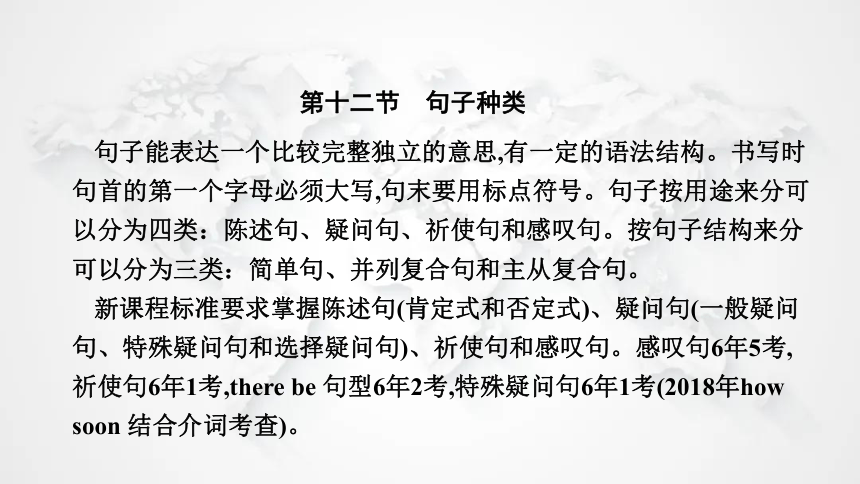
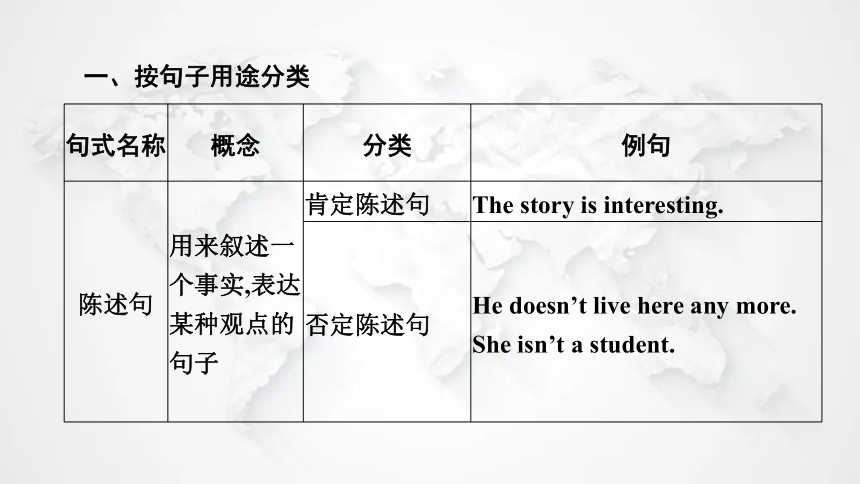
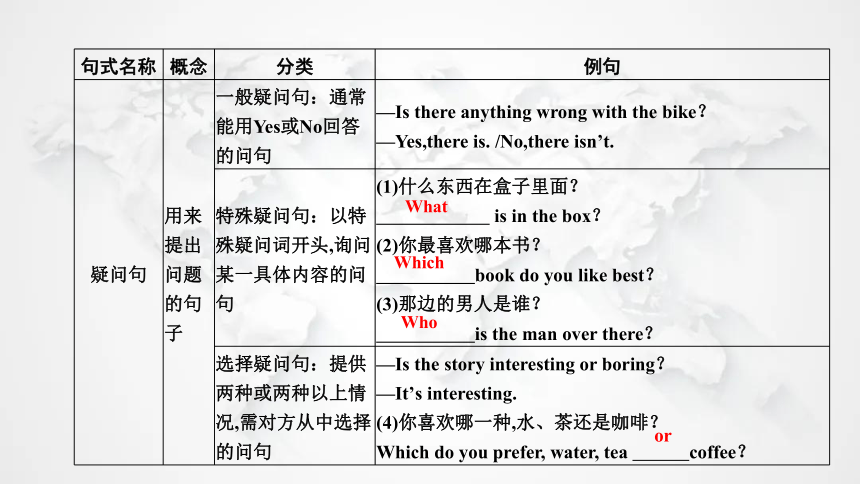
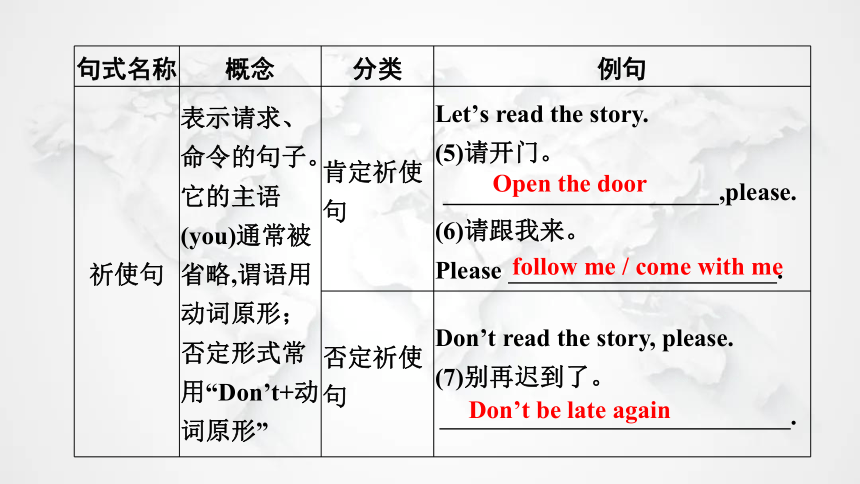
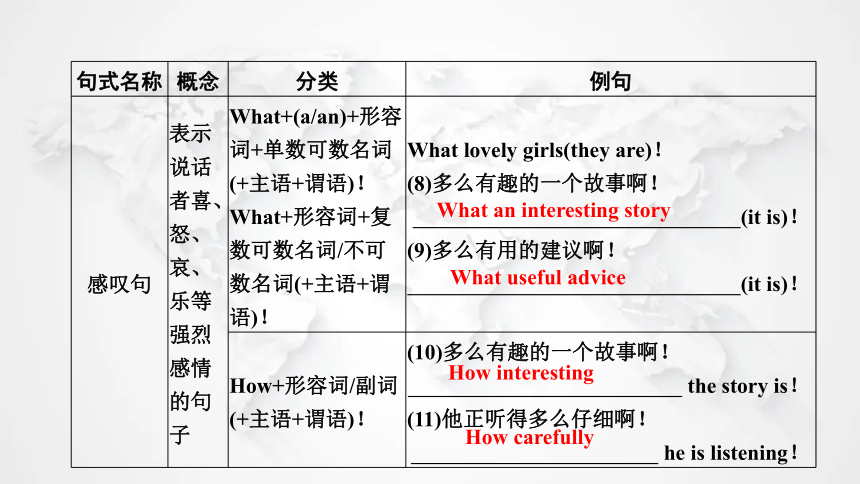
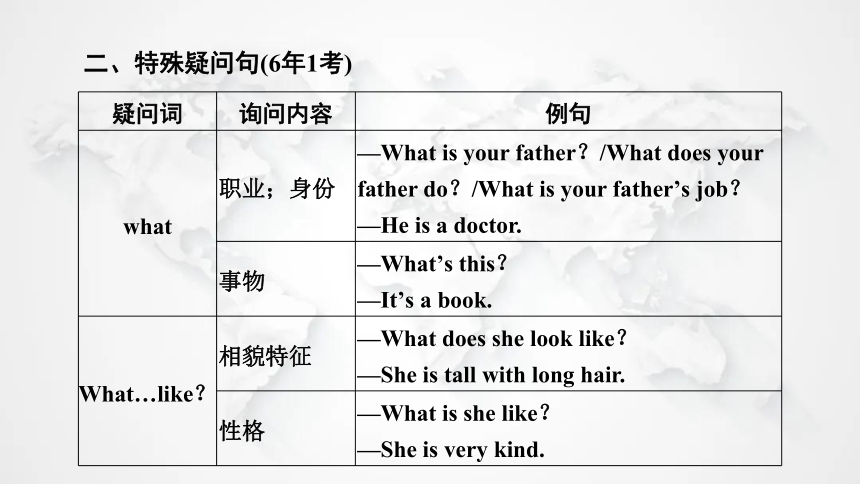
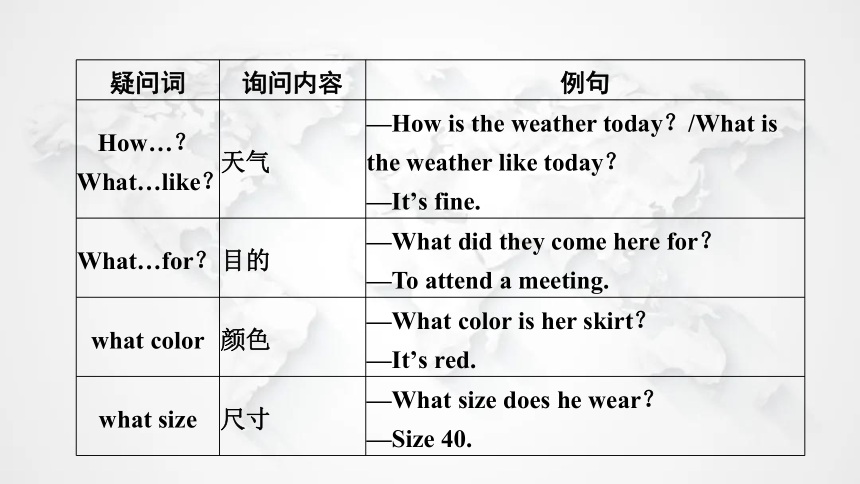
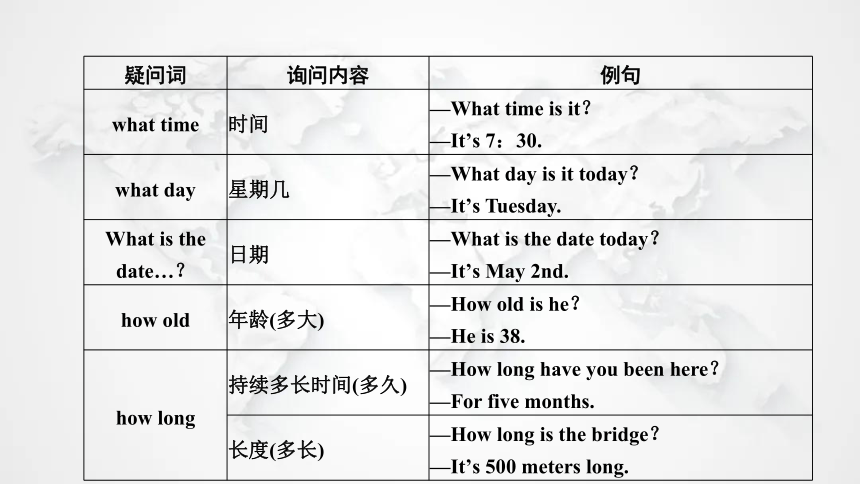
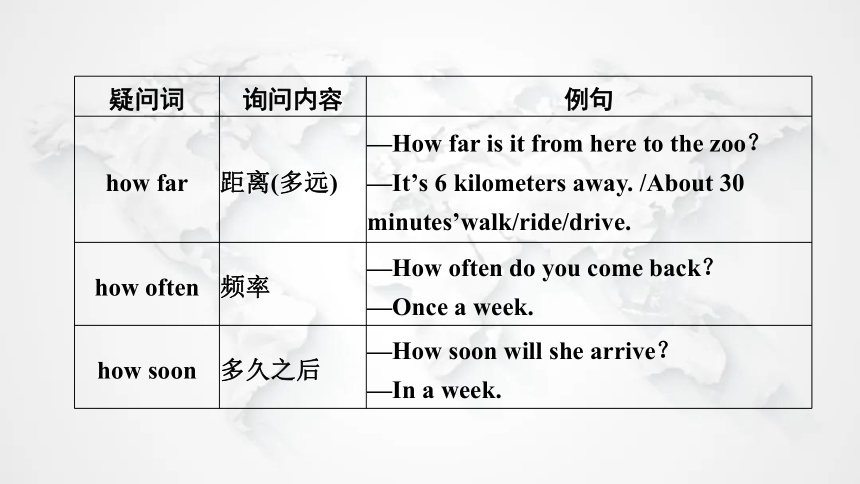
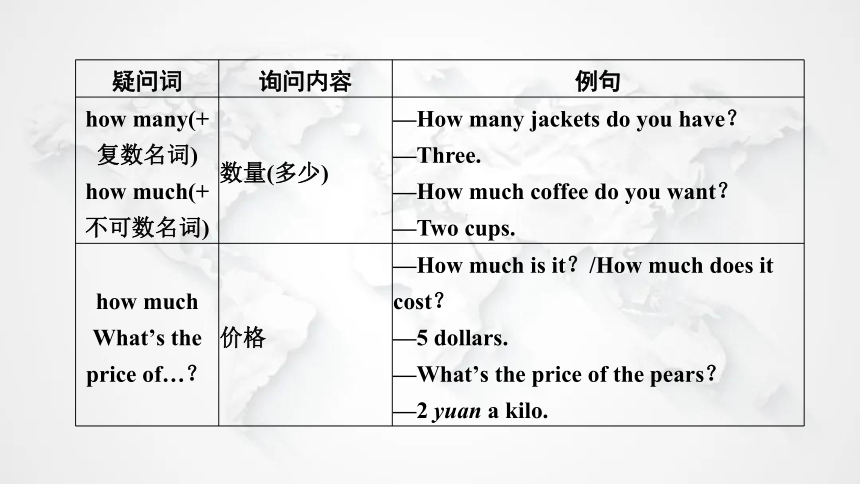
文档简介
(共45张PPT)
考点解读
01
KAO DIAN JIE DU
满分突破
02
MAN FEN TU PO
真题链接
03
ZHEN TI LIAN JIE
CONTENTS
目录
模拟突破
04
MO NI TU PO
考点解读
KAO DIAN JIE DU
PART ONE
01
第十二节 句子种类
句子能表达一个比较完整独立的意思,有一定的语法结构。书写时句首的第一个字母必须大写,句末要用标点符号。句子按用途来分可以分为四类:陈述句、疑问句、祈使句和感叹句。按句子结构来分可以分为三类:简单句、并列复合句和主从复合句。
新课程标准要求掌握陈述句(肯定式和否定式)、疑问句(一般疑问句、特殊疑问句和选择疑问句)、祈使句和感叹句。感叹句6年5考,祈使句6年1考,there be 句型6年2考,特殊疑问句6年1考(2018年how soon 结合介词考查)。
一、按句子用途分类
句式名称 概念 分类 例句
陈述句 用来叙述一个事实,表达某种观点的句子 肯定陈述句 The story is interesting.
否定陈述句 He doesn’t live here any more.
She isn’t a student.
句式名称 概念 分类 例句
疑问句 用来提出问题的句子 一般疑问句:通常能用Yes或No回答的问句 —Is there anything wrong with the bike?
—Yes,there is. /No,there isn’t.
特殊疑问句:以特殊疑问词开头,询问某一具体内容的问句 (1)什么东西在盒子里面?
is in the box?
(2)你最喜欢哪本书?
book do you like best?
(3)那边的男人是谁?
is the man over there?
选择疑问句:提供两种或两种以上情况,需对方从中选择的问句 —Is the story interesting or boring?
—It’s interesting.
(4)你喜欢哪一种,水、茶还是咖啡?
Which do you prefer, water, tea coffee?
What
Which
Who
or
句式名称 概念 分类 例句
祈使句 表示请求、命令的句子。它的主语(you)通常被省略,谓语用动词原形;否定形式常用“Don’t+动词原形” 肯定祈使句 Let’s read the story.
(5)请开门。
,please.
(6)请跟我来。
Please .
否定祈使句 Don’t read the story, please.
(7)别再迟到了。
.
Open the door
follow me / come with me
Don’t be late again
句式名称 概念 分类 例句
感叹句 表示说话者喜、怒、哀、乐等强烈感情的句子 What+(a/an)+形容词+单数可数名词(+主语+谓语)!
What+形容词+复数可数名词/不可数名词(+主语+谓语)! What lovely girls(they are)!
(8)多么有趣的一个故事啊!
(it is)!
(9)多么有用的建议啊!
(it is)!
How+形容词/副词(+主语+谓语)! (10)多么有趣的一个故事啊!
the story is!
(11)他正听得多么仔细啊!
he is listening!
What an interesting story
What useful advice
How interesting
How carefully
二、特殊疑问句(6年1考)
疑问词 询问内容 例句
what 职业;身份 —What is your father?/What does your father do?/What is your father’s job?
—He is a doctor.
事物 —What’s this?
—It’s a book.
What…like? 相貌特征 —What does she look like?
—She is tall with long hair.
性格 —What is she like?
—She is very kind.
疑问词 询问内容 例句
How…?/What…like? 天气 —How is the weather today?/What is the weather like today?
—It’s fine.
What…for? 目的 —What did they come here for?
—To attend a meeting.
what color 颜色 —What color is her skirt?
—It’s red.
what size 尺寸 —What size does he wear?
—Size 40.
疑问词 询问内容 例句
what time 时间 —What time is it?
—It’s 7:30.
what day 星期几 —What day is it today?
—It’s Tuesday.
What is the date…? 日期 —What is the date today?
—It’s May 2nd.
how old 年龄(多大) —How old is he?
—He is 38.
how long 持续多长时间(多久) —How long have you been here?
—For five months.
长度(多长) —How long is the bridge?
—It’s 500 meters long.
疑问词 询问内容 例句
how far 距离(多远) —How far is it from here to the zoo?
—It’s 6 kilometers away. /About 30 minutes’walk/ride/drive.
how often 频率 —How often do you come back?
—Once a week.
how soon 多久之后 —How soon will she arrive?
—In a week.
疑问词 询问内容 例句
how many(+复数名词)
how much(+不可数名词) 数量(多少) —How many jackets do you have?
—Three.
—How much coffee do you want?
—Two cups.
how much
What’s the price of…? 价格 —How much is it?/How much does it cost?
—5 dollars.
—What’s the price of the pears?
—2 yuan a kilo.
疑问词 询问内容 例句
how tall(人;树)
how high(山;建筑物) 高度(多高) —How tall is she?
—She’s 1. 73 meters tall.
—How high is the tower?
—It’s 450 meters high.
when 什么时候 —When shall we meet?
—At ten o’clock.
who 姓名或关系 —Who is that boy?
—He is Jack. /He is my brother.
why 原因 —Why did they come here?
—Because they have a meeting to attend.
疑问词 询问内容 例句
how 方式 —How do you usually go to school?
—On foot.
where 地点 —Where are you going?
—To the library.
三、按句子的结构分类
句式名称及概念 例句
简单句:
只含有一个主
谓结构的句子 主语+系动词+表语;
主语+不及物动词;
主语+及物动词+宾语;
主语+及物动词+间接宾语+直接宾语;
主语+及物动词+宾语+宾语补足语;
There be+主语+其他 My sister is a nurse.
He has left.
I often read books.
She gave me a pen. =She gave a pen to me.
He asked me to do it again.
There is a book and some pens on the desk.
句式名称及概念 例句
并列句:
由两个或几
个分句组成 由并列连词and, but, or等连接主谓结构的复合句(注:当一个并列句有两个或两个以上分句组成时,通常只在最后两个分句间使用连词,前面分句间用逗号) She’s a teacher, and he’s a worker.
She is clever, but she is lazy.
Hurry up, or you can’t catch the bus.
句式名称及概念 例句
复合句:
含有主句和
从句的句子 宾语从句 He said(that)she was wrong.
状语从句 I’ll go there if it’s fine tomorrow.
Although it rained,they had a good time.
定语从句 I like the books that/which are full of funny jokes.
四、易错点突破
(一)感叹句( what a/an 6年3考, how 6年2考)
通常由what, how引导,表示赞美、惊叹、喜悦、愤怒等感情,句末常用感叹号。
1. 用what引导的感叹句用来修饰名词,名词前可以有不定冠词或形容词。结构:
(1) What+a/an+形容词+单数可数名词(+主语+谓语)!
(2) What+形容词+复数名词或不可数名词 (+主语+谓语)! 如:
What an unusual day (it is)! 这天真不寻常呀!
What wonderful ideas (we have)! 我们的主意多好啊!
What dirty water (it is)! 这水真脏啊!
2. 用how引导的感叹句用来修饰形容词和副词。结构:How+形容词或副词+主语+谓语! 如:
How lovely the baby is! 这个宝宝真可爱啊!
How wonderfully this girl sings! 这个女孩唱得多好呀!
(二)there be 句型(6年2考,主要考查一般疑问句)
1. there be句型表示“某地(或某时)有某人(或某物)”,结构为“There be+主语+地点/时间状语”。
如:There is a desk and two chairs in the room. 房间里有一张桌子和两把椅子。
There aren’t two chairs and a desk in the room. 房间里没有两把椅子和一张桌子。
— Is there anything wrong with your ears? 你的耳朵有什么问题吗?
— Yes, there is. /No, there isn’t. 是的,有问题。/不,没有问题。
2. there be与have的区别:
(1)there be句型表示“存在”关系,have表示“所属”关系,两者不能混合在一个句子中。
如:There is going to/will be a class meeting tomorrow. 明天将有一个班会。
(2)既表示“存在”关系又表示“所属”关系时,两种都可以用。
如:Class Three has a map of China on the wall.
三班有一张中国地图在墙上。(指地图为三班学生所有)
There is a map of China on the wall in Class Three.
有一张中国地图在三班的墙上。(指地图存在于三班)
满分突破
MAN FEN TU PO
PART TWO
02
一、句子种类在语法选择中的考查
在语法选择中,考查的主要是感叹句和there be句型。
1. 感叹句一般考查what 和how 的区别。
(1)(2023·广东中考·10题) excited David was!
A. How B. What C. What an
A
(2)(2023·中山一模)— Listen! Someone is playing the piano.
— Wow! beautiful music it is! I love it very much.
A. How B. What a C. What an D. What
(3)(2022·广州市南沙区一模) hard work it is!
A. How B. What C. How a D. What a
D
B
(4)(2021·广州市番禺区一模) wonderful place it is!
A. How B. What C. What a D. How a
C
2. there be 句型一般考查be动词的形态,一般根据上下文的时态和就近原则可以推测出答案。
(1)(2023·广州中考)Some people throw away rubbish everywhere,so a lot of around us.
A. there are; pollution B. there are; pollutions
C. there is; pollution D. there is; pollutions
C
(2)(2022·广州中考)There a book and two pens on the desk in the reading room. Whose are they?
A. has B. have C. are D. is
(3)(2022·江门模拟)— students are there in your class?
— 50 students in my class,24 girls and 26 boys.
A. How much; There is B. How much; There has
C. How many; There are D. How many; There have
D
C
二、句子种类在短文填空中的考查
在短文填空中,主要考查的是感叹句和there be句型,规则同上。
1. (2022·广东中考·67题)You may not know popular tea is.
2. (2021·广州模拟)There too many tourists travelling during labour Day.
how
are / were
真题链接
ZHEN TI LIAN JIE
PART THREE
03
( )1. — good advice it is! I’m sure to have a wonderful summer vacation.
— I’m so glad that you like it. (2023·锦州市)
A. How B. What a C. What D. What an
C
( )2. useful knowledge the astronaut in Tiangong Classroom has taught us!
(2023·营口市)
A. How B. What C. How a D. What a
B
( )3. The C919,China’s self-made large plane, is now in use. exciting the news is!
(2023·淮安市)
A. How B. How an C. What D. What an
A
( )4. swimming in the river! It’s dangerous! (2023·西藏自治区)
A. Go B. Goes C. Don’t go D. To go
( )5. — do you learn these words by heart?
— By using them in different ways. (2023·天水市)
A. When B. How C. Why D. Where
C
B
( )6. — Mr Wu, can I keep the guitar?
— For five days. (2023·淮安市)
A. How often B. How soon
C. How long D. How much
C
( )7. — do you tidy your own room?
— Twice a week. (2023·北京市)
A. How often B. How soon
C. How much D. How long
A
( )8. less time on the phone at night,or you will find it hard to fall asleep.
(2023·长春市)
A. Spend B. Spending C. To spend D. Spent
A
( )9. There a volleyball game next Saturday. If it we’ll have to put it off.
(2022·黄石市)
A. is going to be; rains B. is going to be; will rain
C. is going to have; will rain D. is going to have; rains
A
( )10. — There a lot of new magazines in our school reading room.
— Oh, really? Shall we go there this afternoon (2023·宿迁市)
A. is B. was C. are D. were
C
模拟突破
MO NI TU PO
PART FOUR
04
语法选择(2022·中山二模改编)
“Shared grandmas” is a team of retired (退休的) women in the southwest of China. They help the working parents 1 up the children from school and help the kids with their homework. These working parents have no relatives or friends to help them, 2 they felt really thankful for that.
Deng,66,is 3 member of the team who took part in the program. Every workday, she picks up the children from school, and stays with them while they finish their homework and play in the community room 4 their parents pick them up. “I thought I had nothing to do 5 the volunteer job because of my age. However, 6 difference the job makes to my life! Now I feel young with the kids and my life is much 7 ,”she said. She thought the activity is great and worth developing in other places in the country. “The retired women in the community 8 to take part in this public
service. The interactions (互动) between the families in need and shared-grandmas are both helpful. The feeling of happiness means a lot to 9 . ” Peng Mei, from Shipingcun community, said.
The “shared-grandmas” program began in Chengdu in 2019. Since then, it 10 a new style of public happiness — taking care of the young and cheering the old up.
( )1. A. picking B. to pick C. picks
( )2. A. so B. but C. or
( )3. A. / B. a C. the
( )4. A. while B. if C. until
( )5. A. for B. with C. about
( )6. A. what B. how C. what a
( )7. A. meaningful B. more meaningful C. most meaningful
( )8. A. are encouraged B. were encouraged C. encourages
( )9. A. themselves B. them C. theirs
( )10. A. created B. creates C. has created
B
A
B
C
B
C
B
A
B
C
考点解读
01
KAO DIAN JIE DU
满分突破
02
MAN FEN TU PO
真题链接
03
ZHEN TI LIAN JIE
CONTENTS
目录
模拟突破
04
MO NI TU PO
考点解读
KAO DIAN JIE DU
PART ONE
01
第十二节 句子种类
句子能表达一个比较完整独立的意思,有一定的语法结构。书写时句首的第一个字母必须大写,句末要用标点符号。句子按用途来分可以分为四类:陈述句、疑问句、祈使句和感叹句。按句子结构来分可以分为三类:简单句、并列复合句和主从复合句。
新课程标准要求掌握陈述句(肯定式和否定式)、疑问句(一般疑问句、特殊疑问句和选择疑问句)、祈使句和感叹句。感叹句6年5考,祈使句6年1考,there be 句型6年2考,特殊疑问句6年1考(2018年how soon 结合介词考查)。
一、按句子用途分类
句式名称 概念 分类 例句
陈述句 用来叙述一个事实,表达某种观点的句子 肯定陈述句 The story is interesting.
否定陈述句 He doesn’t live here any more.
She isn’t a student.
句式名称 概念 分类 例句
疑问句 用来提出问题的句子 一般疑问句:通常能用Yes或No回答的问句 —Is there anything wrong with the bike?
—Yes,there is. /No,there isn’t.
特殊疑问句:以特殊疑问词开头,询问某一具体内容的问句 (1)什么东西在盒子里面?
is in the box?
(2)你最喜欢哪本书?
book do you like best?
(3)那边的男人是谁?
is the man over there?
选择疑问句:提供两种或两种以上情况,需对方从中选择的问句 —Is the story interesting or boring?
—It’s interesting.
(4)你喜欢哪一种,水、茶还是咖啡?
Which do you prefer, water, tea coffee?
What
Which
Who
or
句式名称 概念 分类 例句
祈使句 表示请求、命令的句子。它的主语(you)通常被省略,谓语用动词原形;否定形式常用“Don’t+动词原形” 肯定祈使句 Let’s read the story.
(5)请开门。
,please.
(6)请跟我来。
Please .
否定祈使句 Don’t read the story, please.
(7)别再迟到了。
.
Open the door
follow me / come with me
Don’t be late again
句式名称 概念 分类 例句
感叹句 表示说话者喜、怒、哀、乐等强烈感情的句子 What+(a/an)+形容词+单数可数名词(+主语+谓语)!
What+形容词+复数可数名词/不可数名词(+主语+谓语)! What lovely girls(they are)!
(8)多么有趣的一个故事啊!
(it is)!
(9)多么有用的建议啊!
(it is)!
How+形容词/副词(+主语+谓语)! (10)多么有趣的一个故事啊!
the story is!
(11)他正听得多么仔细啊!
he is listening!
What an interesting story
What useful advice
How interesting
How carefully
二、特殊疑问句(6年1考)
疑问词 询问内容 例句
what 职业;身份 —What is your father?/What does your father do?/What is your father’s job?
—He is a doctor.
事物 —What’s this?
—It’s a book.
What…like? 相貌特征 —What does she look like?
—She is tall with long hair.
性格 —What is she like?
—She is very kind.
疑问词 询问内容 例句
How…?/What…like? 天气 —How is the weather today?/What is the weather like today?
—It’s fine.
What…for? 目的 —What did they come here for?
—To attend a meeting.
what color 颜色 —What color is her skirt?
—It’s red.
what size 尺寸 —What size does he wear?
—Size 40.
疑问词 询问内容 例句
what time 时间 —What time is it?
—It’s 7:30.
what day 星期几 —What day is it today?
—It’s Tuesday.
What is the date…? 日期 —What is the date today?
—It’s May 2nd.
how old 年龄(多大) —How old is he?
—He is 38.
how long 持续多长时间(多久) —How long have you been here?
—For five months.
长度(多长) —How long is the bridge?
—It’s 500 meters long.
疑问词 询问内容 例句
how far 距离(多远) —How far is it from here to the zoo?
—It’s 6 kilometers away. /About 30 minutes’walk/ride/drive.
how often 频率 —How often do you come back?
—Once a week.
how soon 多久之后 —How soon will she arrive?
—In a week.
疑问词 询问内容 例句
how many(+复数名词)
how much(+不可数名词) 数量(多少) —How many jackets do you have?
—Three.
—How much coffee do you want?
—Two cups.
how much
What’s the price of…? 价格 —How much is it?/How much does it cost?
—5 dollars.
—What’s the price of the pears?
—2 yuan a kilo.
疑问词 询问内容 例句
how tall(人;树)
how high(山;建筑物) 高度(多高) —How tall is she?
—She’s 1. 73 meters tall.
—How high is the tower?
—It’s 450 meters high.
when 什么时候 —When shall we meet?
—At ten o’clock.
who 姓名或关系 —Who is that boy?
—He is Jack. /He is my brother.
why 原因 —Why did they come here?
—Because they have a meeting to attend.
疑问词 询问内容 例句
how 方式 —How do you usually go to school?
—On foot.
where 地点 —Where are you going?
—To the library.
三、按句子的结构分类
句式名称及概念 例句
简单句:
只含有一个主
谓结构的句子 主语+系动词+表语;
主语+不及物动词;
主语+及物动词+宾语;
主语+及物动词+间接宾语+直接宾语;
主语+及物动词+宾语+宾语补足语;
There be+主语+其他 My sister is a nurse.
He has left.
I often read books.
She gave me a pen. =She gave a pen to me.
He asked me to do it again.
There is a book and some pens on the desk.
句式名称及概念 例句
并列句:
由两个或几
个分句组成 由并列连词and, but, or等连接主谓结构的复合句(注:当一个并列句有两个或两个以上分句组成时,通常只在最后两个分句间使用连词,前面分句间用逗号) She’s a teacher, and he’s a worker.
She is clever, but she is lazy.
Hurry up, or you can’t catch the bus.
句式名称及概念 例句
复合句:
含有主句和
从句的句子 宾语从句 He said(that)she was wrong.
状语从句 I’ll go there if it’s fine tomorrow.
Although it rained,they had a good time.
定语从句 I like the books that/which are full of funny jokes.
四、易错点突破
(一)感叹句( what a/an 6年3考, how 6年2考)
通常由what, how引导,表示赞美、惊叹、喜悦、愤怒等感情,句末常用感叹号。
1. 用what引导的感叹句用来修饰名词,名词前可以有不定冠词或形容词。结构:
(1) What+a/an+形容词+单数可数名词(+主语+谓语)!
(2) What+形容词+复数名词或不可数名词 (+主语+谓语)! 如:
What an unusual day (it is)! 这天真不寻常呀!
What wonderful ideas (we have)! 我们的主意多好啊!
What dirty water (it is)! 这水真脏啊!
2. 用how引导的感叹句用来修饰形容词和副词。结构:How+形容词或副词+主语+谓语! 如:
How lovely the baby is! 这个宝宝真可爱啊!
How wonderfully this girl sings! 这个女孩唱得多好呀!
(二)there be 句型(6年2考,主要考查一般疑问句)
1. there be句型表示“某地(或某时)有某人(或某物)”,结构为“There be+主语+地点/时间状语”。
如:There is a desk and two chairs in the room. 房间里有一张桌子和两把椅子。
There aren’t two chairs and a desk in the room. 房间里没有两把椅子和一张桌子。
— Is there anything wrong with your ears? 你的耳朵有什么问题吗?
— Yes, there is. /No, there isn’t. 是的,有问题。/不,没有问题。
2. there be与have的区别:
(1)there be句型表示“存在”关系,have表示“所属”关系,两者不能混合在一个句子中。
如:There is going to/will be a class meeting tomorrow. 明天将有一个班会。
(2)既表示“存在”关系又表示“所属”关系时,两种都可以用。
如:Class Three has a map of China on the wall.
三班有一张中国地图在墙上。(指地图为三班学生所有)
There is a map of China on the wall in Class Three.
有一张中国地图在三班的墙上。(指地图存在于三班)
满分突破
MAN FEN TU PO
PART TWO
02
一、句子种类在语法选择中的考查
在语法选择中,考查的主要是感叹句和there be句型。
1. 感叹句一般考查what 和how 的区别。
(1)(2023·广东中考·10题) excited David was!
A. How B. What C. What an
A
(2)(2023·中山一模)— Listen! Someone is playing the piano.
— Wow! beautiful music it is! I love it very much.
A. How B. What a C. What an D. What
(3)(2022·广州市南沙区一模) hard work it is!
A. How B. What C. How a D. What a
D
B
(4)(2021·广州市番禺区一模) wonderful place it is!
A. How B. What C. What a D. How a
C
2. there be 句型一般考查be动词的形态,一般根据上下文的时态和就近原则可以推测出答案。
(1)(2023·广州中考)Some people throw away rubbish everywhere,so a lot of around us.
A. there are; pollution B. there are; pollutions
C. there is; pollution D. there is; pollutions
C
(2)(2022·广州中考)There a book and two pens on the desk in the reading room. Whose are they?
A. has B. have C. are D. is
(3)(2022·江门模拟)— students are there in your class?
— 50 students in my class,24 girls and 26 boys.
A. How much; There is B. How much; There has
C. How many; There are D. How many; There have
D
C
二、句子种类在短文填空中的考查
在短文填空中,主要考查的是感叹句和there be句型,规则同上。
1. (2022·广东中考·67题)You may not know popular tea is.
2. (2021·广州模拟)There too many tourists travelling during labour Day.
how
are / were
真题链接
ZHEN TI LIAN JIE
PART THREE
03
( )1. — good advice it is! I’m sure to have a wonderful summer vacation.
— I’m so glad that you like it. (2023·锦州市)
A. How B. What a C. What D. What an
C
( )2. useful knowledge the astronaut in Tiangong Classroom has taught us!
(2023·营口市)
A. How B. What C. How a D. What a
B
( )3. The C919,China’s self-made large plane, is now in use. exciting the news is!
(2023·淮安市)
A. How B. How an C. What D. What an
A
( )4. swimming in the river! It’s dangerous! (2023·西藏自治区)
A. Go B. Goes C. Don’t go D. To go
( )5. — do you learn these words by heart?
— By using them in different ways. (2023·天水市)
A. When B. How C. Why D. Where
C
B
( )6. — Mr Wu, can I keep the guitar?
— For five days. (2023·淮安市)
A. How often B. How soon
C. How long D. How much
C
( )7. — do you tidy your own room?
— Twice a week. (2023·北京市)
A. How often B. How soon
C. How much D. How long
A
( )8. less time on the phone at night,or you will find it hard to fall asleep.
(2023·长春市)
A. Spend B. Spending C. To spend D. Spent
A
( )9. There a volleyball game next Saturday. If it we’ll have to put it off.
(2022·黄石市)
A. is going to be; rains B. is going to be; will rain
C. is going to have; will rain D. is going to have; rains
A
( )10. — There a lot of new magazines in our school reading room.
— Oh, really? Shall we go there this afternoon (2023·宿迁市)
A. is B. was C. are D. were
C
模拟突破
MO NI TU PO
PART FOUR
04
语法选择(2022·中山二模改编)
“Shared grandmas” is a team of retired (退休的) women in the southwest of China. They help the working parents 1 up the children from school and help the kids with their homework. These working parents have no relatives or friends to help them, 2 they felt really thankful for that.
Deng,66,is 3 member of the team who took part in the program. Every workday, she picks up the children from school, and stays with them while they finish their homework and play in the community room 4 their parents pick them up. “I thought I had nothing to do 5 the volunteer job because of my age. However, 6 difference the job makes to my life! Now I feel young with the kids and my life is much 7 ,”she said. She thought the activity is great and worth developing in other places in the country. “The retired women in the community 8 to take part in this public
service. The interactions (互动) between the families in need and shared-grandmas are both helpful. The feeling of happiness means a lot to 9 . ” Peng Mei, from Shipingcun community, said.
The “shared-grandmas” program began in Chengdu in 2019. Since then, it 10 a new style of public happiness — taking care of the young and cheering the old up.
( )1. A. picking B. to pick C. picks
( )2. A. so B. but C. or
( )3. A. / B. a C. the
( )4. A. while B. if C. until
( )5. A. for B. with C. about
( )6. A. what B. how C. what a
( )7. A. meaningful B. more meaningful C. most meaningful
( )8. A. are encouraged B. were encouraged C. encourages
( )9. A. themselves B. them C. theirs
( )10. A. created B. creates C. has created
B
A
B
C
B
C
B
A
B
C
同课章节目录
- 词法
- 名词
- 动词和动词短语
- 动词语态
- 动词时态
- 助动词和情态动词
- 非谓语动词
- 冠词
- 代词
- 数词和量词
- 形容词副词及其比较等级
- 介词和介词短语
- 连词和感叹词
- 构词法
- 相似、相近词比较
- 句法
- 陈述句
- 一般疑问句和否定疑问句
- 特殊疑问句及选择疑问句
- 反意疑问句
- 存在句(There be句型)
- 宾语从句
- 定语从句
- 状语从句
- 主谓一致问题
- 简单句
- 并列句
- 复合句
- 主谓一致
- 主、表语从句
- 名词性从句
- 直接引语和间接引语
- 虚拟语气
- 感叹句
- 强调句
- 倒装句
- 祈使句
- 句子的成分
- 句子的分类
- 题型专区
- 单项选择部分
- 易错题
- 完形填空
- 阅读理解
- 词汇练习
- 听说训练
- 句型转换
- 补全对话
- 短文改错
- 翻译
- 书面表达
- 任务型阅读
- 语法填空
- 其他资料
